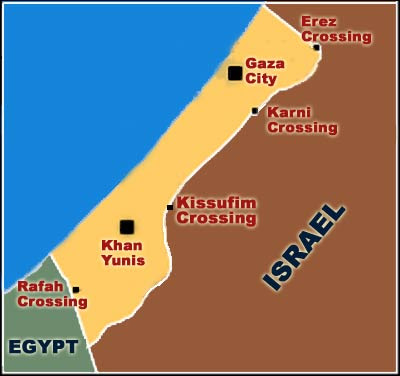UPDATES
For UK journalists, a kinder, gentler Gaza
Jun 14, 2012 | Ahron Shapiro

Five years ago this month, Hamas militants turned their guns on Fatah-led Palestinian Authority (PA) forces in the Gaza Strip. Following eight days of fighting, during which time over 160 people were killed, Hamas completed its purge of the PA from the Gaza Strip. In response, PA President Mahmoud Abbas dissolved a Fatah-Hamas unity government, replaced Hamas’ Ismail Haniyeh with technocrat Salam Fayaad, and consolidated his control of the West Bank. Israel and Egypt instituted a blockade of Gaza, while the US and EU lifted diplomatic sanctions on the PA while at the same time imposing harsher ones on Hamas in Gaza.
With help from Iran, Hamas built a stockpile of smuggled imported arms – including longer-range rockets – and increased its rocket production as well as the number of attacks it launched against Israel. This eventually lead to Israel’s strong military response in the form of Operation Cast Lead, launched in the final days of 2008.
None of this context, however, has found its way into recent coverage of the anniversary of the Hamas takeover in two UK newspapers, the Guardian and the Independent. Both papers chose to frame their coverage of the milestone purely in terms of the blockade, which Israel eased substantially following the Turkish Gaza flotilla incident of 2010, and not the cause of the blockade, namely Hamas’ illegitimate takeover of the Strip and ongoing violent rejectionism.
Not settling for merely a story or two on this milestone, the Guardian dispatched multiple reporters to Gaza and dedicated a special “live blogging” section of their website to the subject. Their coverage also included an Op-Ed by Hamas’ leader in Gaza Ismail Haniyeh, which prompted Robin Shepherd, publisher of UK opinion portal The Commentator to ask “Is the Guardian the most bigoted newspaper in Britain?“
To its credit, the Guardian admitted to what amounts to a fundamental bias in its coverage as part of the editor’s notes for its special Gaza feature, insomuch as its opinion on the legality of the Gaza blockade are not supported by the UN, US or EU, to name a few.
What is the Guardian’s position on Gaza?
The Guardian’s leader line is that the Gaza blockade is illegal in international law, that it constitutes collective punishment, and that it has not had its intended political outcome, which was to kill support for Hamas, drive a permanent wedge between it and Fatah and divide the Palestinians.
As such, its coverage, which is uniformly sympathetic to the Gazan and Hamas position, is hopelessly compromised, and none of the dozen or so “human interest” stories the paper filed in their special coverage can be seen as impartial.
The Independent, which devoted a single feature-length article to the subject in their paper of Sunday, June 10, mounts a separate attack on economic sanctions against Gaza.
http://www.independent.co.uk/news/world/middle-east/the-state-of-gaza-five-years-after-hamas-took-power-in-the-city-how-has-life-changed-for-its-citizens-7831408.html?printService=print
To quote from the story’s “nut graph”:
Why is Israel still maintaining an export ban which, in [UNRWA head Filippo] Grandi’s words, has “penalised” the “common people” and the “business community” of Gaza but has left its Hamas rulers intact and unscathed?
By reading the story, which relies heavily on testimony from Gazan businessmen eager to resume commerce with Israel – with input on the Israeli side from the pro-Gaza Israeli NGO Gisha and Haaretz‘s staunchly and extremely left-wing columnist Amira Haas – it is impossible to fathom why Israel still has a problem with Hamas, other than carrying a lingering grudge for past differences.
Gaza’s threat to Israel’s citizens is downplayed, or more accurately, ignored entirely, as are the hostile statements by Hamas’ leaders. The word “rocket” is only used once in the story, and only as part of an attempt to undermine Israel with a conspiracy theory about the supposed nefarious, secret motives of the Israeli government:
It’s hard not to escape the conclusion – heavily denied by Israel – that there have been convenient aspects to a separated and Hamas-controlled Gaza, especially when military officers admit privately that the faction, for now, is often active in preventing smaller groups from firing rockets at Israel. The split between Gaza and the West Bank is, after all, an obstacle to the full two-state solution that many doubt the Netanyahu government really wants.
The message implicit behind the stories by the Guardian and Independent are clear – Israel’s sanctions on Gaza are an obstacle to peace – remove them and peace will follow. Evidence to the contrary? Not worthy of discussion.
Buried in the Guardian‘s coverage was the response by Israeli Prime Minister Binyamin Netanyahu’s spokesman Mark Regev, posted by the paper in a perfunctory way.
In the past two years we’ve moved to liberalise sanctions on Gaza, and indeed we’ve been praised for it. We’ve allowed products into Gaza and expanded exports from Gaza.
But in a case where you have a regime in Gaza that has declared war on every man, woman and child in Israel, whose leaders’ goal is ending [the state of] Israel, a regime in the process of a very serious arms build-up – in that sort of conflict situation, Israeli is entitled to impose economic sanctions. Is it logical to expect from Israel normal economic relations with Gaza when the regime there is so hostile to Israel?
Our goal is to try to hurt the Hamas regime, not to see the people of Gaza suffer. We don’t see the people of Gaza as our enemy. The people of Gaza, like the people of southern Israel, are the victims of this very extreme regime that rules the Gaza Strip…
Further liberalisation is our longer-term policy goal. But we had an attack from Gaza last weekend. The regime there is committed to armed struggle against Israel. In that framework it’s difficult to talk about normal economic relations.
Ahron Shapiro
Tags: Palestinians











